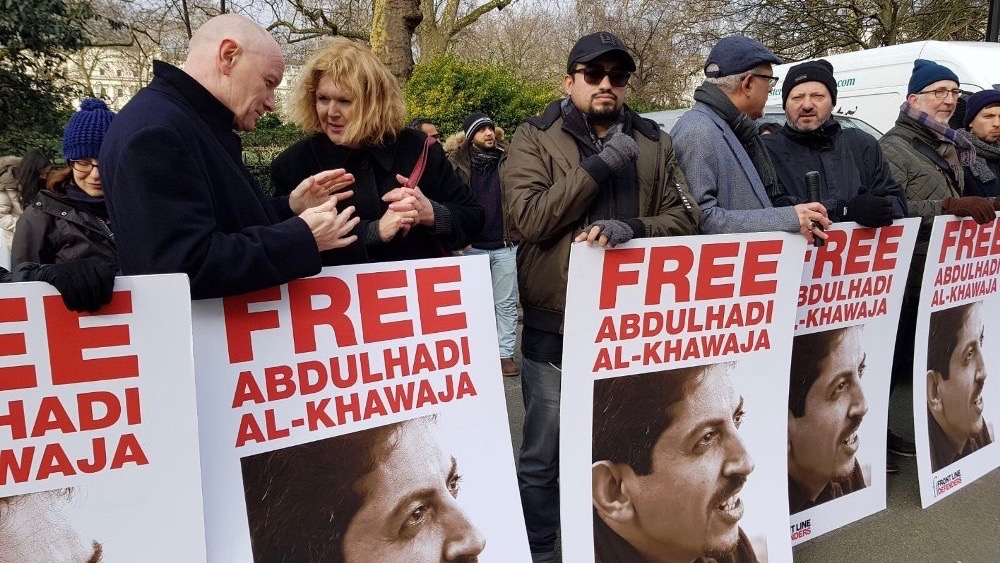Prominent Bahraini human rights activist Abdulhadi al-Khawaja, who is in prison serving a life sentence, has launched a hunger strike to protest the authorities’ decision to ban him from receiving calls from his family, Middle East Eye reported on Tuesday, November 16, quoting his daughter, Zaynab. 60-year-old al-Khwaja, who is the former president of the Bahrain Center of Human Rights, was convicted in 2011 on charges of “organizing and managing a terrorist organization,” among other charges, and awarded life imprisonment. He was arrested during the height of the anti-government protests of 2011 that erupted in the country demanding more democracy, freedoms, and equality for the majority Shia Muslim population. The protests were brutally crushed by the minority Sunni Bahraini regime with the help of neighboring Saudi Arabia. Thousands were attacked, imprisoned, and punished through mass trials and prison terms. Several protesters even had their citizenship revoked.
Al-Khwaja has been in prison for the last 10 years. His family alleges that over these years, their access to him has been sporadic. Al-Khwaja’s daughter Zaynab, in a post on Twitter, said, “my father, Abdulhadi al-Khawaja, has started a hunger strike today. The prison administration informed him that he is not allowed to make any calls. Having had no visitation rights for the past two years, these calls were his only communication with us.” His other daughter, Maryam, who is herself a prominent pro-democracy and human rights activist and living in exile due to a sentence against her, had said in February this year, “you can never expect what’s going to happen; you might have a call this week but then next week there isn’t a call. So nothing is ever set in stone.”
Human rights groups and activists worldwide have consistently appealed to the Bahraini regime to release al-Khwaja. Many have also called on international organizations, including the European Union, and United Nations, to intervene in the matter and pressure the Bahraini regime for his release. On the occasion of his 60th birthday in April this year, the UN special rapporteur on the situation of human rights defenders, Mary Lawlor, called for his release. She said in a statement, “He’s serving a life sentence in prison for peacefully defending the rights of others. He’s been given an unfair trial and details of his torture have been corroborated by an independent commission of inquiry.” She added that she had known him for many years and “witnessed his committed work for human rights in the Middle East”. She urged the Bahraini govt “to finally release Abdulhadi in time for his 60th birthday on April 5. His family have been fragmented and dislocated and have suffered greatly over the past ten years; it would be an honorable and compassionate act to allow them to reunite.”
Similarly, in January, over 100 international and Bahraini human rights groups had written to the Danish government to increase efforts to obtain al-Khwaja’s release as he is a dual Danish-Bahraini citizen. At the time, Joe Stork, deputy Middle East director at Human Rights Watch, had said that, “there is no doubt that the conviction and sentencing of Abdulhadi al-Khawaja was unfair and oppressive and tried to silence his prominent voice demanding the rights of Bahrainis. Al-Khawaja should not have had to spend a single minute behind bars, yet he has been unjustly detained for almost a decade.”
Human rights groups have been expressing alarm at the deterioration of the human rights situation in Bahrain, continuing unabated since the protests of 2011. A report released earlier this year by London-based campaign group Bahrain Institute for Rights and Democracy noted that since 2011, at least 51 people had been sentenced to death in Bahrain, an estimated 300 Bahraini citizens have had their citizenship denaturalized, and mass trials are increasingly becoming “commonplace.” It documented one instance of the mass trial of 167 people in a single day in February 2019. There have also been several reports revealing serious human rights abuses such as torture used against prisoners, forced confession in cases where the accused is slapped with the death penalty, false and fabricated charges of “terrorism” and custodial deaths.





